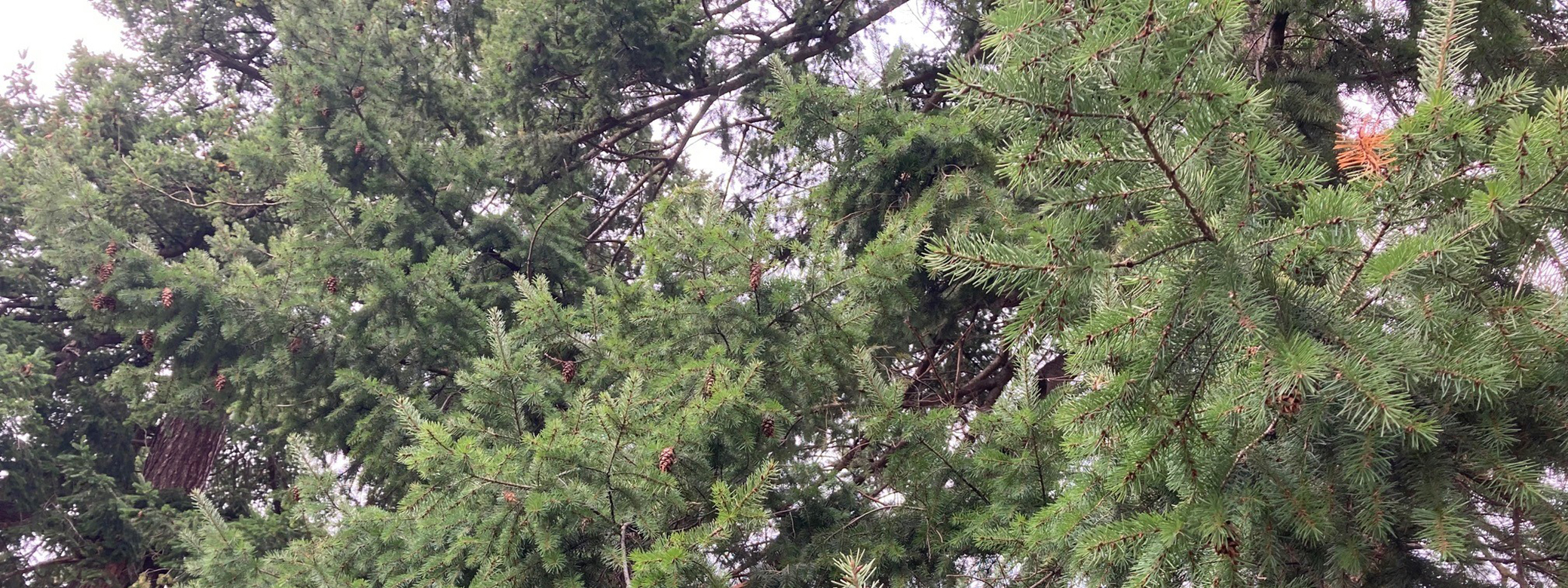The College of Arts & Sciences is pleased to celebrate the many awards and honors that faculty, staff, and alumni have received over the past few months for their research, leadership, teaching, and other accomplishments. Congratulations to all!
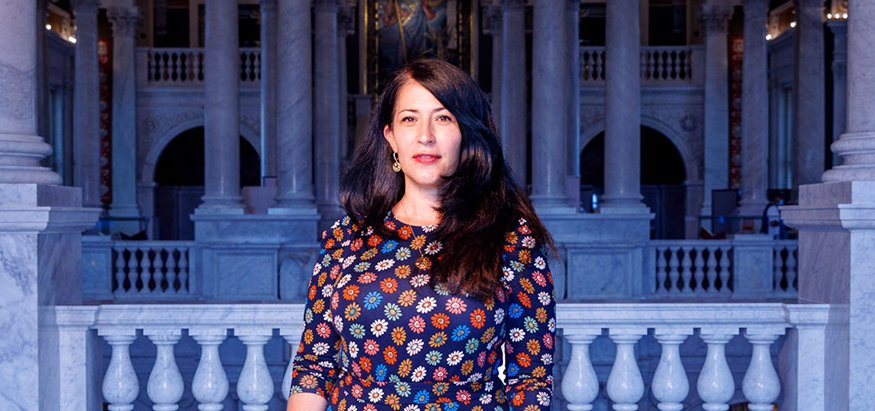
Limón Named to TIME Women of the Year
For UW School of Drama alumna Ada Limón (BA, Drama, 1998), the past 12 months have been a whirlwind. First she was appointed to a second two-year second term as US Poet Laureate. Then she was awarded a MacArthur Fellowship “genius grant.” Now for the hat trick: Just weeks ago, Limón was named to the 2024 TIME magazine “Women of the Year” list, along with 11 other notable women.
"The 2024 TIME Women of the Year are all leading the way in creating a more equal world and are making real change through their commitments to the environment, human rights, fair treatment for all people, and more,” said TIME Chief Executive Office Jessica Sibley, according to PR Newswire. The annual list is a continuation of a recent TIME project that highlighted 100 influential women from the past century.
Responding to the news on her Instagram page, Limón wrote, “Not often speechless, but words are leaving me now. A bit weepy to be honest. What a deep honor and otherworldly thrill to join these phenomenal women!”
Limón has remained connected to the University of Washington. As commencement speaker for the UW School of Drama in 2021, she recalled stepping into Hutchinson Hall (home of the School of Drama) for the first time as a newly arrived first-year student. “Here were my people,” she said. “Those loud, laughing creative souls that roamed and vibrated the halls were exactly what I had been looking for. Those humans who are interested in making art, interested in exploring the deeply human stories that bind us all together.”
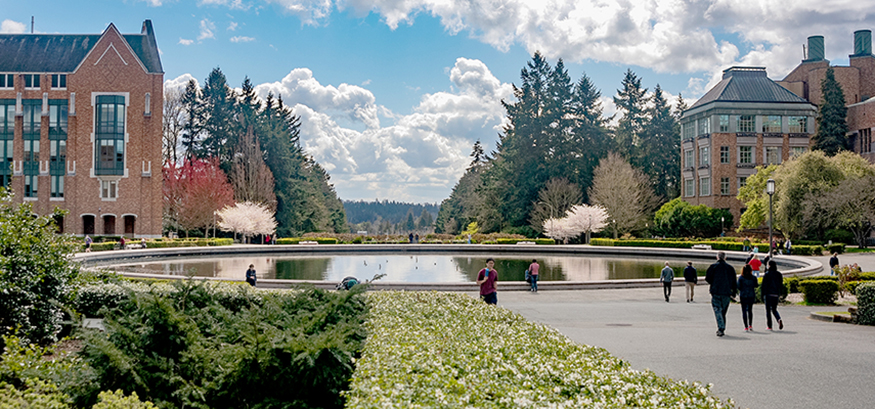
Mellon Support for Futurists
If you could design a university today, unfettered by past practices, where would you start? What would you prioritize? Who would you invite into the conversation? A group of faculty in the UW College of Arts & Sciences, known as the Dean’s Academy Futurists, are taking on that challenge, imagining what higher education might look like after 2050 and envisioning new models for the liberal arts. The College recently received a $150,000 grant from the Mellon Foundation to support the Futurists’ work over the next two years.
The Futurists are one pillar of a larger initiative, Rethinking the Academy, launched by Arts & Sciences Dean Dianne Harris to create opportunities to envision the near and longer-term futures of teaching, learning, and research in the College.
The Futurists’ initial focus will be the future of the humanities. Current challenges in the humanities include declining majors, fewer graduates, and continual questions about the legitimacy and relevance of humanities disciplines. Through intensive, multi-day off-site sessions, the Futurists will examine and question the current practice of the humanities and a liberal arts education at the UW and generate ideas and prototypes for alternative approaches.
Over the course of the past year, the College launched the pilot phase of the Dean’s Academic Futurists’ work, which included establishing a shared mission, engaging with principles of Futurist thinking and action, and governance to guide their ongoing efforts. Over the next two years, with Mellon Foundation support, the Futurists will hold three off-site multi-day meetings annually and expand their range of ideas by including colleagues from outside the UW at these sessions and at separate, externally-oriented events.
“This is a long-term project, venturing into new territory,” Harris says. "The College is grateful for the Mellon Foundation’s support as we take on this exciting experiment.”
Velian Named Sloan Foundation Fellow
Alexandra Velian, assistant professor of chemistry in the College of Arts & Sciences, was named a Sloan Foundation Fellow in February. The fellowship honors early-career researchers whose achievements mark them among the next generation of scientific leaders.
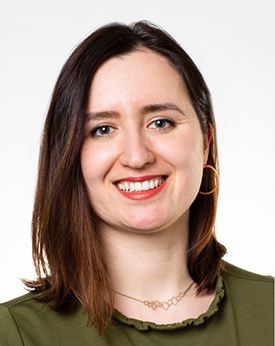
Velian’s research targets the design of new materials that contribute to decarbonization, clean energy, and quantum information technologies. A special focus of her work is to bring molecular precision into the synthesis of single-site catalysts that transform abundant molecules into compounds poised to play central roles in a green economy.
“The traditional trial-and-error approach, which has been effective in developing conventional industrially relevant catalysts such as the Haber-Bosch process for converting nitrogen to ammonia, falls short in addressing current urgent chemical challenges, such as transforming other small molecules like carbon dioxide into environmentally friendly, valuable compounds,” Velian told UW News. “Synthetic strategies to precisely control the composition and surface chemistry of inorganic materials are necessary to design the next generation of catalytic materials.”
Assistant Professors Simon S. Du and Adriana Schulz in the Paul G. Allen School of Computer Science & Engineering were also named Sloan Fellows in February.
Nominated by their peers, fellows are selected by independent panels of senior scholars based on each candidate’s research accomplishments, creativity, and potential to become a leader in their field. Each fellow receives $75,000 to apply toward research endeavors.
More Awards & Honors
Honorary Awards
Publication Awards
New Appointments to Professorships & Endowed Chairs
Other Recognition
Honorary Awards
Eric Camp, director of instruction and chemical safety in the Department of Chemistry, received a Partners in Safety Award from EH&S Laboratory Safety Awards & Innovations, given to individuals who have made a positive safety impact or contribution in their roles to support labs or research groups at the UW.
Leah Ceccarelli, professor and graduate program coordinator for the Department of Communication, received the Outstanding Mentor Award from the American Society for the History of Rhetoric. Ceccarelli’s nomination not only highlighted her accomplishments as a scholar but as an empathetic and attentive advisor who supports the decisions of her mentees.
The Department of American Ethnic Studies (AES) received the Golden Circle Award from OCA-Greater Seattle Asian Pacific American Advocates, for offering one of the most culturally diverse curricula at the UW and listening to often-neglected perspectives to transform stories and experiences into action for change. The organization also noted that AES is recognized by Seattle's communities of color for its civic participation, emphasizing the strengthening of communities through meaningful engagement.
Galya Diment, professor emerita of Slavic languages and literatures, received the Award for Excellence in Post-Secondary Teaching from the American Association of Teachers of Slavic and East European Languages, for "showing uncommonly attentive and compassionate mentorship to undergraduate and graduate students at her institution, particularly in the areas of writing and research. Her former students remember the vibrant atmosphere of her graduate seminars and her consistent advocacy for and direction of their dissertation writing."
Hussein Elkhafaifi, associate professor of Middle Eastern Languages & Cultures, received the American Association of Teachers of Arabic (AATA) Lifetime Achievement Award for 2024. The award acknowledges Elkhafaifi’s longstanding commitment to the field of Arabic pedagogy, linguistics, socio-linguistics, and culture.
Zaid Harchaoui and Abel Rodriguez, professors of statistics, have been elected as members of the International Statistics Institute (ISI). The ISI is a global hub for statisticians to connect with the international statistics community. Election members have made significant contributions in statistical research, practice, education, administration of statistical service, or promotion of the profession.
Adam Leaché, professor of biology, has been awarded a Fulbright US Scholarship. Fulbright Scholar awards provide unique opportunities for scholars to teach and conduct research abroad. With the scholarship, Leaché plans to work at the Foundation for Research and Technology Hellas in the Institute of Computer Science in Greece, where he has established collaborations on biodiversity research on Aegean biogeography.
Douglas Reed, assistant professor of chemistry, and his Scialog: Negative Emissions Science team won the 2023 Scialog Collaborative Innovation Award for their work titled, "Gas Capture by Tuning Electric Fields in Conductive MOFs." The work will be funded by the RCSA and ClimateWorks Foundation.
Nicholas M. Riley, assistant professor of chemistry, received a Young Honors Alumni Award from South Carolina Honors College, University of South Carolina, and a Rising Star Award from the Human Proteome Organization (HUPO). HUPO noted that Riley’s “expertise in mass spectrometry and proteomics has truly opened new avenues to research directions and collaborations that leverage proteomics, phosphoproteomics, and glycoproteomics. …Importantly, his outreach efforts also make sure others across our communities get access to great science.”
Alexandra Velian, assistant professor of chemistry, received a Partners in Safety Award from EH&S Laboratory Safety Awards & Innovations.Velian also received a Sloan Research Fellowship (see story above).
Publication Awards
Chadwick Allen, professor of English, associate vice provost for faculty advancement, and Russell F. Stark University Professor, has won the 2023 Thomas J. Lyon Award for Best Book in Western American Literary and Cultural Studies from the Western Literature Association for his book “Earthworks Rising: Mound Building in Native Literature and Arts.”
Charlotte Coté, professor of American Indian studies, has received multiple awards for her book, “Drum in One Hand, A Sockeye in the Other: Stories of Indigenous Food Sovereignty from the Northwest Coast.” She received the Donald L. Fixico Award from the Western History Association for the most innovative work in the field of American Indian and Canadian First Nations History; the Nautilus Gold Award from Nautilus Book Awards in the multicultural & Indigenous category; and an honorable mention in the 15th Annual Labriola Center American Indian National Book Award Contest.
Hannah Frydman, assistant professor of French Studies in the Department of French and Italian Studies, was awarded the triennial Bailey Prize for Best Journal Article by The New York State Association of European Historians, for the article “Freedom’s Sex Problem: Classified Advertising, Law, and the Politics of Reading in Third Republic France.” The article, published in French Historical Studies, also won the Malcolm Bowie Prize from the Society for French Studies for the best article published in the preceding year by an early-career researcher in French Studies.
Edward (Ted) Mack, professor of Asian languages and literature, received the Aldo and Jeanne Scaglione Prize for East Asian Studies from the Modern Language Association (MLA) for his book, “Acquired Alterity: Migration, Identity, and Literary Nationalism.” The prize honors an outstanding scholarly work in the field of East Asian or East Asian diaspora literary or linguistic studies. Mack is the inaugural winner of the award — the first major MLA award for a book on East Asian literature.
Adrian Raftery, professor of statistics and sociology and Blumstein-Jordan Professor of Statistics, along with UW Statistics PhD alumni Peter Gao and Hannah Director, and Cecilia Bitz, professor of atmospheric sciences, won the Best Paper Award for papers published in 2022 in the JABE, the Journal of Agricultural, Biological and Environmental Statistics.
Sasha Senderovich, associate professor of Jewish studies and Slavic languages and literatures, received the 2023 Best First Book Award from the American Association of Teachers of Slavic and East European Languages for his book, "How the Soviet Jew Was Made." The jury for the award noted that “Senderovich’s book proves to be a masterful study of the Soviet Jew and is sure to inspire generations of future scholars and readers.”
New Appointments to Professorships & Endowed Chairs
Agnieszka Jeżyk, assistant professor of Slavic languages and literatures, was appointed to the Maria Kott Endowed Professorship of Polish Studies.
Stephen Price, artist-in-residence in organ performance, was appointed to the Paul B. Fritts Faculty Fellowship in Organ.
Other Recognition
Nazry Bahrawi, assistant professor of Asian languages and literature, has received a visiting research fellowship from the Centre for Spatial, Environmental and Cultural Politics at the University of Brighton, UK. Nazry’s work on the intersections between animal fables and racial discourses in Malay-Indonesian literary texts and film fits with the Centre’s critical approach to decolonizing research and pedagogy across science, social science, and humanities areas. His fellowship activities also contribute to the Centre’s climate justice and environmental politics theme.
Lauren Buckley, professor of biology, was named vice president of the American Society of Naturalists for 2024. The American Society of Naturalists is a “membership society whose goal is to advance and to diffuse knowledge of organic evolution and other broad biological principles so as to enhance the conceptual unification of the biological sciences.”
Matthew R. Golder, assistant professor of chemistry, along with Lilo Pozzo, David Bergsman, Zachary Sherman in Chemical Engineering, has received a Collaborative Seed Grant from UW’s Clean Energy Institute. The grants are awarded to UW faculty teams to enable their pursuit of center-scale funding for transformative clean energy research. They provide up to $200,000 to explore novel, high-risk/high-reward research topics while seeding new collaborations in research and education that significantly increase the prospects for future extramural support.
Alshakim Nelson, professor of chemistry and Nist Faculty Fellow, received a $1.5 million “Designing Materials to Revolutionize and Engineer our Future” grant from the National Science Foundation.
Jennifer Nemhauser, professor of biology, was elected to a six-year term on the International Plant Growth Substances Association Governing Council. The IPGSA aims to promote the study of plant growth substances at the international level by facilitating the exchange of information, particularly through international conferences.
Anna Preus, assistant professor of English, and Melanie Walsh, assistant professor in the Information School, were awarded a Mellon/Mozilla Responsible Computing Grant of $150,000.
More Stories
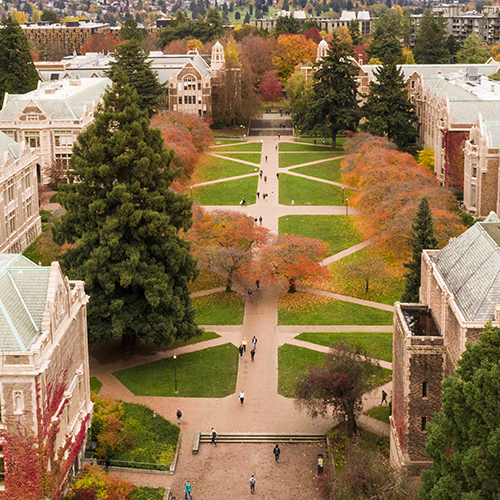
Awards for Research, Social Justice Efforts & More
Recent awards celebrate Arts & Sciences faculty, staff, and alumni for their research, social justice work, lifetime achievements, and more.
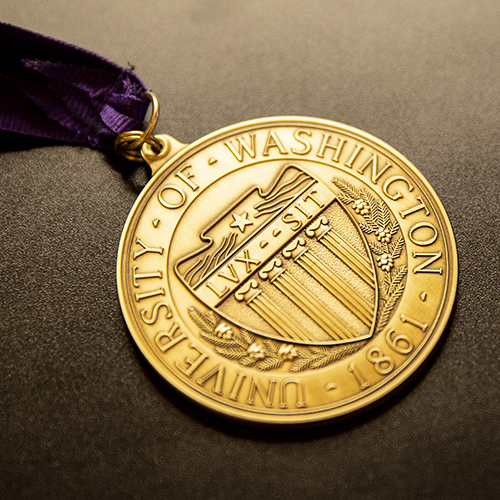
2025 UW Awards of Excellence
Arts & Science faculty and staff were among the recipients of 2025 UW Awards of Excellence for their teaching, leadership, and innovation.
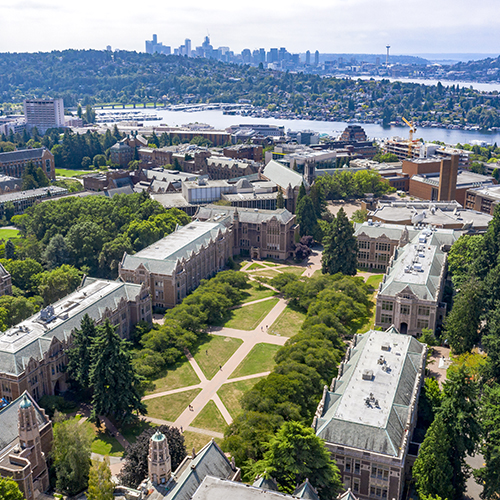
Honors for Impact, Innovation & More
Recent awards celebrate Arts & Sciences faculty, staff, and students for their research, leadership, and more.
